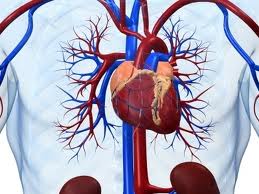Before diving into new ways to check your coronary heart disease risks, you need to know something amazing about your hard working heart. Your heart is a muscle about the size of your clenched fist and weighs about less than a pound.  It starts beating even before you are born. In an adult, it beats over 100,000 times per day and pumps over 4000 gallons of blood every day through over 60,000 miles of blood vessels supplying nourishment to every cell in the body. That’s what I call a full day’s work! In return, all your heart demand is also blood which is supplied by coronary arteries. I hope this helps you to realize amazing work of heart and inspires you to keep your coronary pipes whistle clean along with the blood that flows through them.
It starts beating even before you are born. In an adult, it beats over 100,000 times per day and pumps over 4000 gallons of blood every day through over 60,000 miles of blood vessels supplying nourishment to every cell in the body. That’s what I call a full day’s work! In return, all your heart demand is also blood which is supplied by coronary arteries. I hope this helps you to realize amazing work of heart and inspires you to keep your coronary pipes whistle clean along with the blood that flows through them.
New Ways to Check Your Risks
Perhaps you are familiar with your lipid numbers in your blood test. Elevated cholesterol level is the main concern for coronary heart disease. Particularly increase in LDL (low-density lipoproteins) bad cholesterol level and or decrease in HDL (high-density lipoproteins) good cholesterol level. HDL is good because it acts like a vacuum cleaner picking up cholesterol deposits from the walls of blood vessels and delivering them  to liver for flushing them out. However, bad cholesterol LDL is known to create plaque on the arteries walls causing blockage which plays a major role in coronary heart disease. We have been doing tests in this way for a long time.
to liver for flushing them out. However, bad cholesterol LDL is known to create plaque on the arteries walls causing blockage which plays a major role in coronary heart disease. We have been doing tests in this way for a long time.
The new part is if you conduct a more in depth blood test, you find out a level of Apolipoprotein which is found in both HDL and LDL. However, among many different types of Apolipoproteins found in HDL and LDL, it is Apolipoprotein E (ApoE) found in LDL is of main interest to us. ApoE is known to play an important role in coronary heart disease according to study see below (1).
The most interesting part is the genetic variations of ApoE gene. The ApoE gene comes in three types 2, 3, 4. This means having one gene from mom and one from dad, you could have genetic makeup of one of the following pairs: 2/2, 2/3, 2/4, 3/3, 3/4, or 4/4.  Incidentally the genetic makeup 2/2 showed up in the Ayurvedic body type Vata, the 3/3 genetic makeup showed up in Pitta body type, and the 4/4 genetic makeup showed up in Ayurvedic body type Kapha. Just as Kapha is more susceptible to high cholesterol, diabetes, & heart disease, the person with ApoE 4/4 is also placed at higher risk for diabetes and heart disease. In the study cited below persons with ApoE 3/3 were at less risk than the ApoE 2/2 for heart attack. This also agrees with Ayurvedic assessment as the Vata type body is at increased risk of coronary heart disease because it is more vulnerable to nerves disorders and stress. Here is another instance where ancient Ayurvedic science and modern science are corroborating.
Incidentally the genetic makeup 2/2 showed up in the Ayurvedic body type Vata, the 3/3 genetic makeup showed up in Pitta body type, and the 4/4 genetic makeup showed up in Ayurvedic body type Kapha. Just as Kapha is more susceptible to high cholesterol, diabetes, & heart disease, the person with ApoE 4/4 is also placed at higher risk for diabetes and heart disease. In the study cited below persons with ApoE 3/3 were at less risk than the ApoE 2/2 for heart attack. This also agrees with Ayurvedic assessment as the Vata type body is at increased risk of coronary heart disease because it is more vulnerable to nerves disorders and stress. Here is another instance where ancient Ayurvedic science and modern science are corroborating.
How could you benefit from it? You could find out your risk level long before your cholesterol level goes up and this could give you years of jump on prevention.
So in addition to in depth lipid blood test, you can request the ApoE genotype test plus have your mind-body constitution done by an Ayurvedic practitioner, especially if you have a family history of coronary heart disease. Look for a follow on article on how to prevent heart disease using natural home remedies.
1. Carlos Lahoz and Ernst J. Schaefer, et al, Apolipoprotein E genotype and cardiovascular disease in the Framingham Heart Study Atherosclerosis
Tags: Health Coaching




Is very important to be alert about common coronary heart disease. To know high risks save lives.